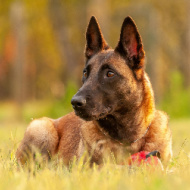Study explores cognitive differences across dog breeds

The Malinois were most likely to be completely independent during the 'unsolvable task' test.
A study published in Scientific Reports has examined cognitive differences between dog breeds, finding differences mainly in social cognition, problem-solving and inhibitory control.
Aiming to provide a more complete picture of cognitive differences in dogs, the study allowed researchers to look at differences between individual breeds rather than breed group classifications, in order advance the ability to predict how individual dogs are likely to behave.
Researchers used the commercial cognitive test battery smartDOG to test the dogs' problem solving skills with food rewards.
Analysing the results, the research team found no breed differences for short-term memory or logical reasoning. Differences were found for social cognition, persistence, inhibitory control, spatial problem-solving ability, activity level, greeting unfamiliar people and exploration of a novel environment.
From the data, it was found that border collies and Australian shepherds had high inhibitory control, while the Belgian shepherd Malinois scored the highest for understanding human gestures.
'Breed differences in social cognition, inhibitory control, and spatial problem-solving ability in the domestic dog (Canis familiaris)' is an open access study.



 The Veterinary Medicines Directorate (VMD) is inviting applications from veterinary students to attend a one-week extramural studies (EMS) placement in July 2026.
The Veterinary Medicines Directorate (VMD) is inviting applications from veterinary students to attend a one-week extramural studies (EMS) placement in July 2026.